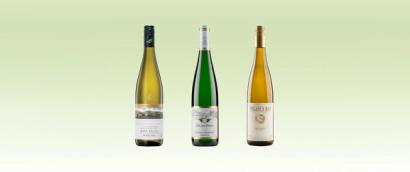
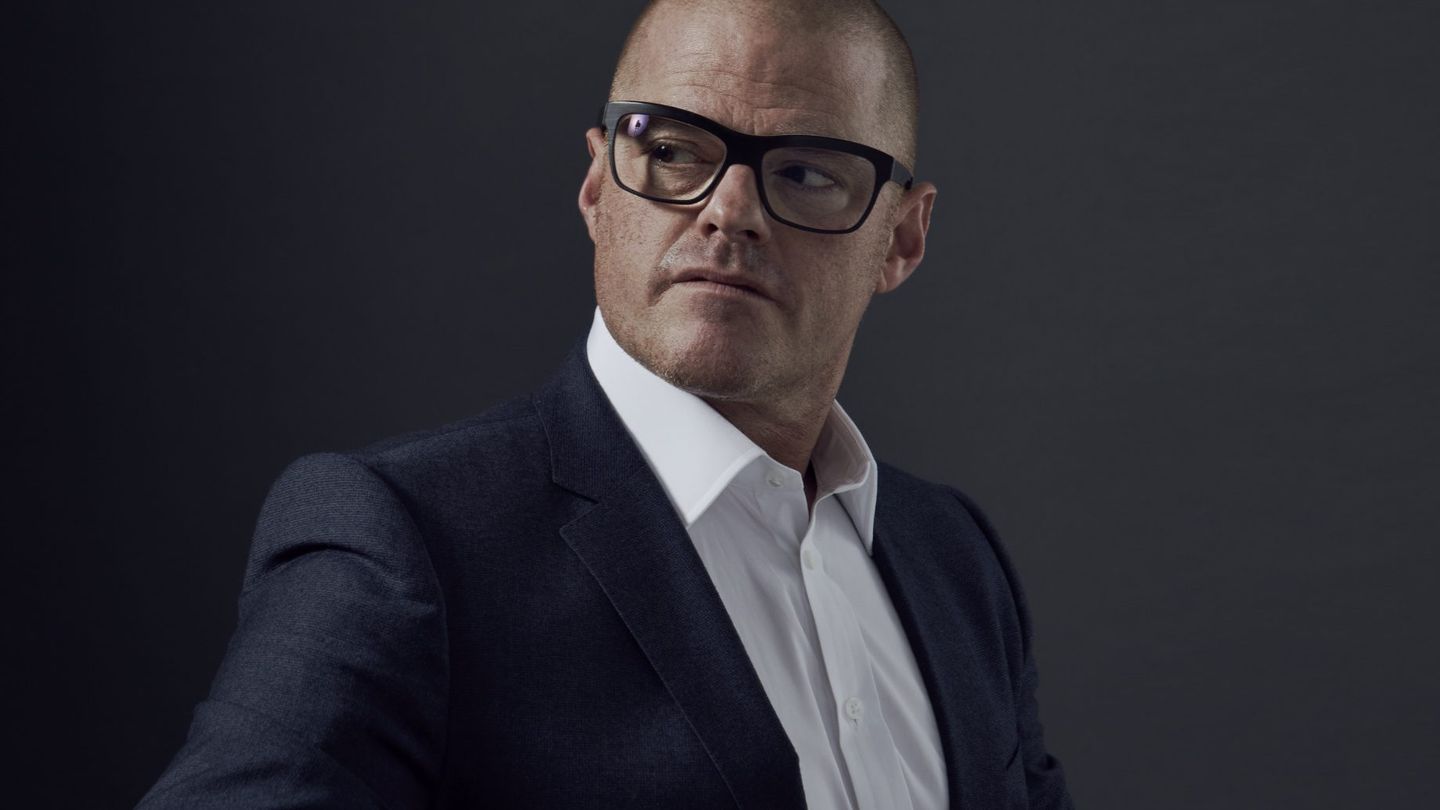
Heston Blumenthal thinks you’re eating all wrong
From whining with your wine to reasoning with your raisins, the eccentric innovator of British cuisine shares his best tricks and techniques from the kitchen
- Words: Jonathan Wells
- Photography: Fred MacGregor
Heston Blumenthal. The name itself is like something out of a storybook. But, then again, so is the man who wears it. And, although it is almost two decades since the Michelin-starred chef was famously dubbed a culinary ‘Willy Wonka’, he still shares staggering similarities with Roald Dahl’s most confectionary creation.
Blumenthal’s kitchen has spawned more unlikely flavours and deeply bizarre products than even the zaniest chocolate factory. His gastro-experiments and resulting dishes — from Parsnip Cereal to Snail Porridge — have upended the traditional à la carte. Even his quirky, inscrutable appearance has something of the Wonka about it; leaving critics and customers alike guessing what’s going on behind those chunky statement specs. (They’re Kirk Originals, if you were wondering…)
But, speaking to Blumenthal today, he seems slightly more taken by another children’s writer. Move aside Roald Dahl, for Lewis Carroll appears to be the order of the day; the chef peppering our conversation with nods and references to the fantastical Victorian author. It shouldn’t come as a surprise — turn your looking-glass on Blumenthal’s wider oeuvre and you’ll soon find more allusions — from a bright pink ‘Drink Me’ potion to a radical spin on the famous Mock Turtle Soup.
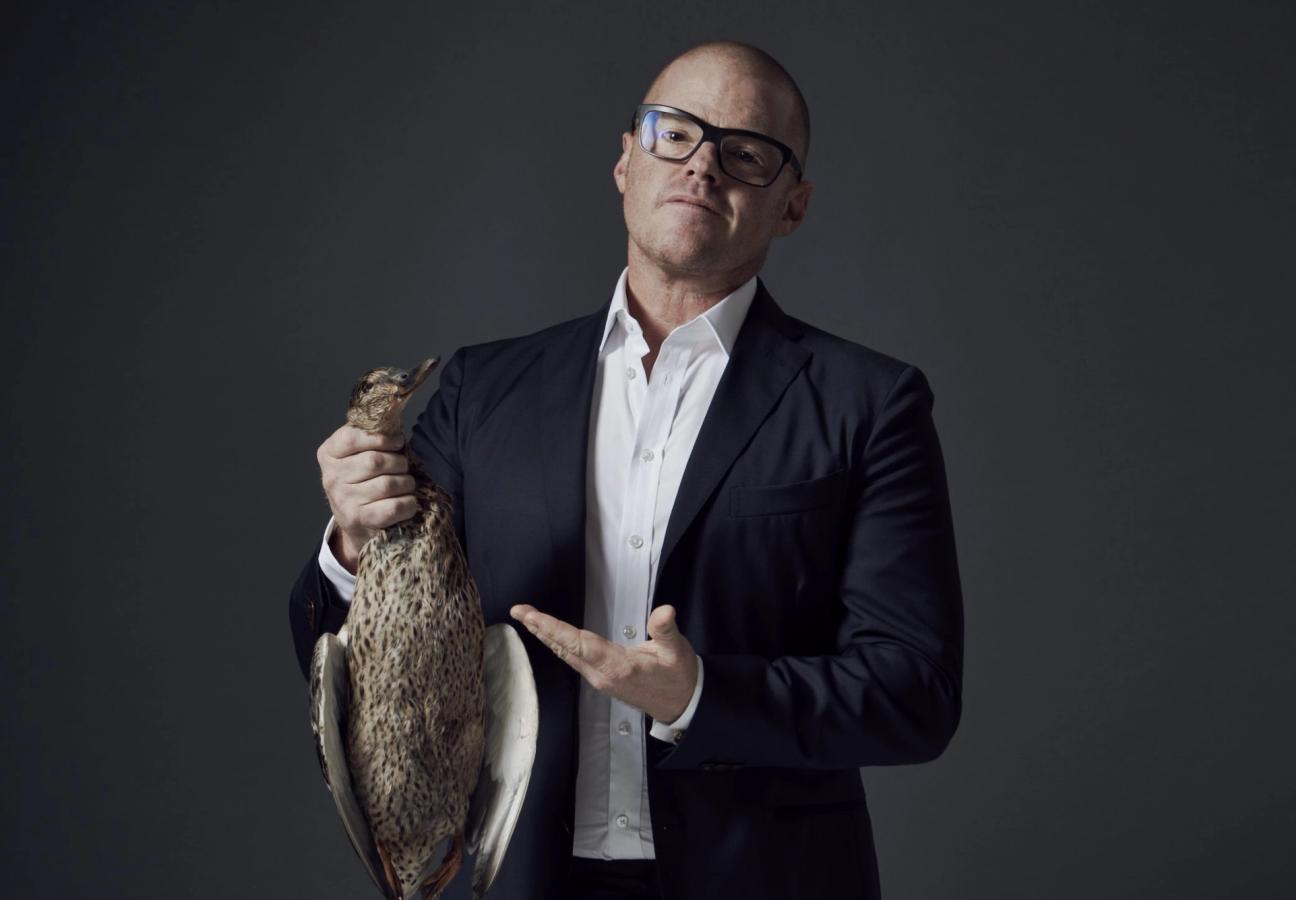
“It’s really like Alice in Wonderland,” Blumenthal rattles off, nimbly. “You know, where she talks to herself? Alice knows that having conversations with herself is valuable, and that’s why she opens herself up to them more. That’s what we need to do; to maintain the intimate relationship we have with ourselves.”
If this sounds a little out of context that’s because Blumenthal, as he is wont to do, has swan-dived into a conversation halfway through — his thoughts streaming out in a cascade that is as exciting as it is confusing as it is articulate. To catch you up (although I barely have myself), the chef is hashing out his theory that everyone should talk to themselves more; to set aside time to personally enjoy and consider the trifles and trivialities of everyday life.
“Today, we live in a world so full of distractions that we don’t realise how many things are out there ready to be discovered,” the chef laments, slightly letting up his pace. “If we’re eating something, or drinking something, there’s always someone tapping on our shoulders. There are buses and planes going by or people trying to sell us things on apps on our phones. All these distractions take us away from ourselves.”
"If we’re eating something, or drinking something, there’s always someone tapping on our shoulders..."
Blumenthal longs for less complication. His first television special in years aired over the 2019 festive period, and saw the chef attempt to recreate the pioneering 2001 tasting menu from his award-winning Bray-based super-pub, The Fat Duck. Teaming up with food critic Giles Coren on the project, it was a chance to step back into simpler times — and an experience, Blumenthal reveals, that he relished.
“Back then, I didn’t have a mobile phone,” he laughs. “I didn’t even have an internet connection. And my lab — let’s call it my lab — was a garden shed in the back garden. I discovered that, when you create something new, or even just get handed something new, you get to discover it for yourself. That’s a new level of awareness; the chance to experience something new in a different way.”
Blumenthal has always been a strong proponent of things different. Yet, despite managing to capture the magic he first conjured up in a garden shed two decades ago, the chef’s offerings have since teetered close to the edge of gimmickry. Cast your mind back just a couple of years, and Heston Blumenthal was coming dangerously close to overcooking himself. His name, that once crackled with excitement, was fast becoming a byword for kooky food combos and questionable recipes.
Three years ago, the chef moved to rural France — determined to go back to basics. Blumenthal basics, that is. You’ll still find combinations and collisions of unexpected tangs and tastes in his cooking, but they’ll only make it to the plate if they really, really work together. The shock factor has been put on the back burner.
“That’s the reason I first stuck my neck out back in 1997,” Blumenthal says of his first ground-breaking menus. “I had always been driven by a fear of failure — but my belief in myself became stronger than my fear.
“Today,” he adds slyly, “I look back on the nicknames — being called an ‘alchemist’ or a ‘Willy Wonka’ type — and realise how much more comfortable and confident I am in my own skin. I’ve had my dodgy reviews; I’ve served my time. I think I’ve had a transformation.”
Before you worry, dear eaters, there is no cause for concern. You can still sip at liquid nitrogen cocktails at Heston’s bar in Bray, or scoop up Sherbet Gin or Lapsang Souchong smoked salmon from Waitrose. The chef’s enduring partnership with the high-end supermarket chain is one of his most famous endeavours, and features another literary ‘Lewis Carroll’ touch in the form of a Mad Hatter’s Top Hat celebration cake. The dessert has an almond tiffin base, sherbet lemon sponge, salted caramel flourishes and sweetly begs the questions: where does Blumenthal’s flavour inspiration come from?
“Everywhere,” he laughs animatedly. “Everything. I might be going for a run and smell dried figs. Actually, that sounds too exotic. How about concrete, or tarmac? And I could pick up an element of that aroma that reminds me of something else. Banana, say. Not that I’m ever suggesting you should make a tarmac and banana sandwich…”
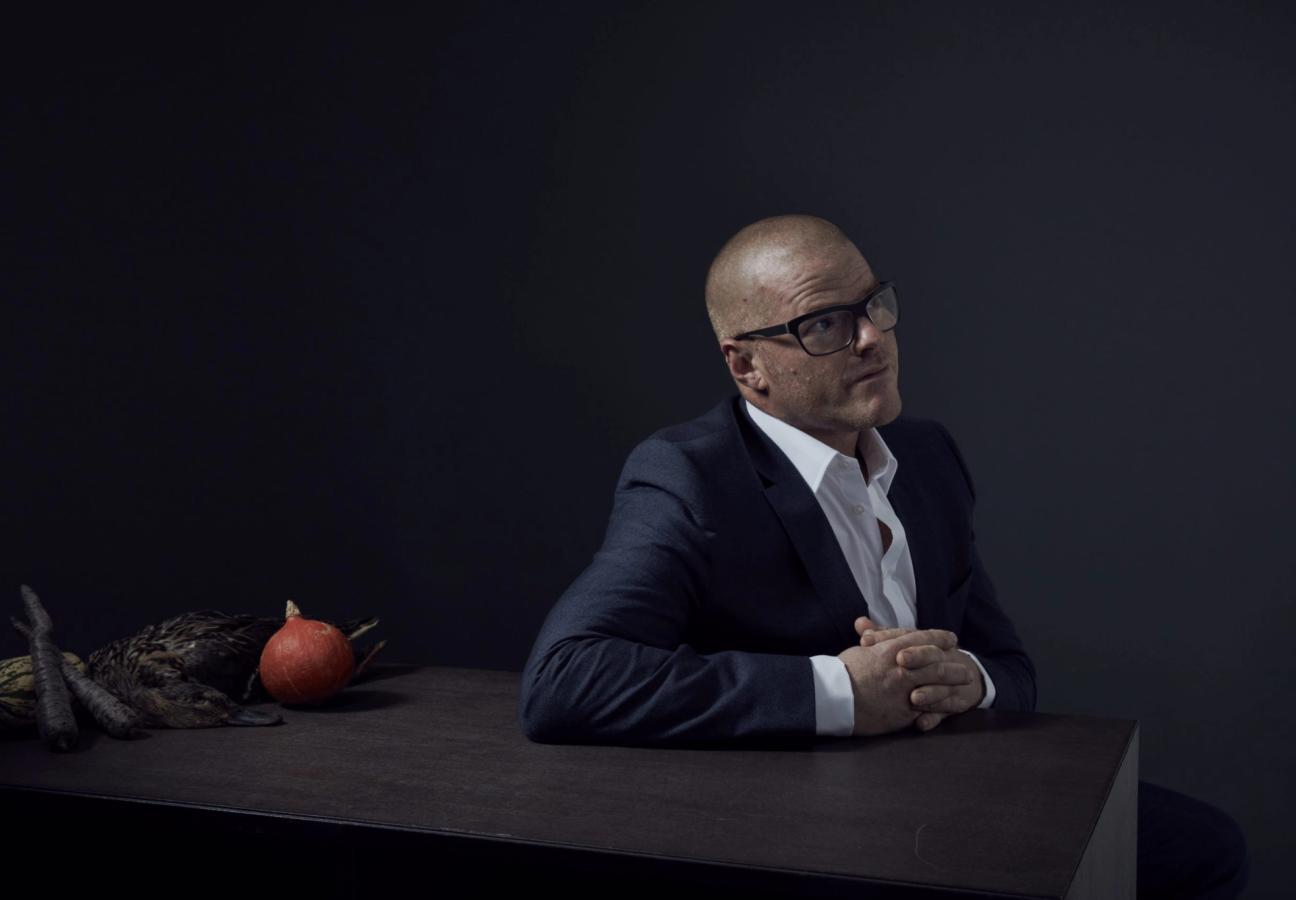
“But that’s how it works,” he adds. “I once threw some parsley on the top of a rabbit stew, put the lid on, and then was hit by this strong smell of banana when I took the lid off again. So I started playing around with parsley and bananas. That’s my relationship with food now — that’s my new level of awareness.”
It’s an awareness that the chef is keen to impart. Whether it be those dining in his restaurants, those shopping in Waitrose or even you reading this, Blumenthal has a series of tips, tricks and techniques he is desperate for you to try. These will, the gastronomer guarantees, change your relationship with food forever. And, fortunately, the first will have you reaching for your wine rack.
"We don’t realise how many things are out there ready to be discovered…"
“Next time you have a glass of red wine in your hand,” Blumenthal instructs me, “take a sip while imagining somebody that fills you with love and joy and happiness. Then, before your next sip, think about somebody who fills you with anger, frustration, rejection, hatred — any negative emotions. And, on your next sip, that same glass of wine will be radically different; it will be bitter — sour.”
It’s all part of humanity’s intimate relationship with food, says Blumenthal. Take his fastidious approach to raisin eating, for example: “Most people just pick up a handful of raisins and stick them in their mouths. But, instead, roll a raisin between your thumb and forefinger. Hold it up to the light. Smell it. Think about what it’s going to taste like. See if it smells different through your left nostril to your right nostril. Wonder about how long it’s been dried for. Think about the farmer who has grown this raisin. Think about his family. Who shipped this raisin to you? Does the temperature of it feel different from your top to bottom lip? Roll it round your mouth. Try this, and that raisin will explode into a new world of flavour.”
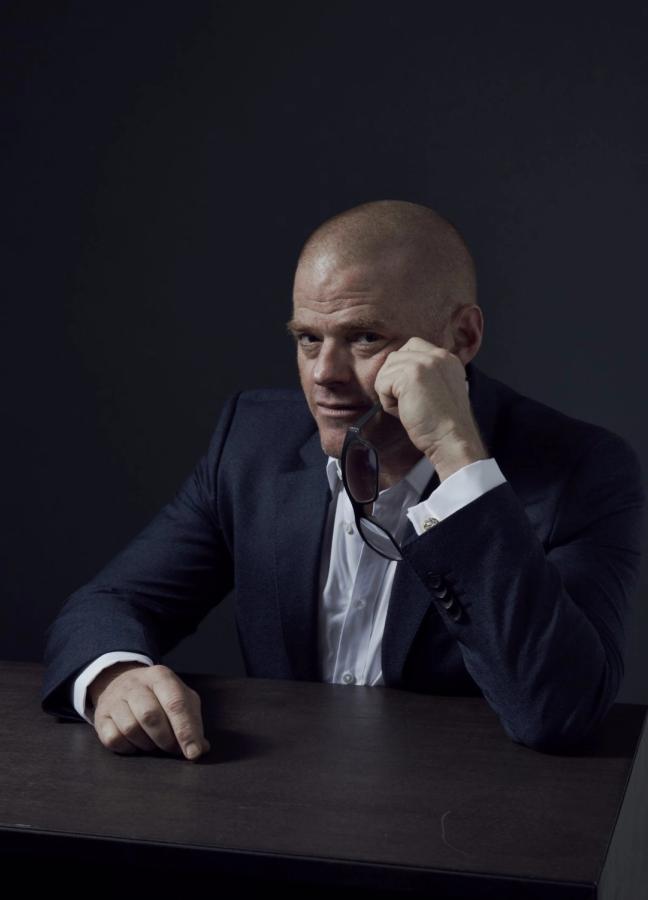
It’s a romantic idea; taking our time with every scrap or morsel that passes our lips. But surely Blumenthal wouldn’t advise people to do this every time they eat?
“I’d advise people to do this every time they eat,” the chef barrels on enthusiastically, before conceding: “But we can’t do that. Most of us have got to get on with our jobs. Just try to eat more mindfully, because it changes everything. I eat much less now, because I value the food that I do eat. And, the more you value what you have, the less you need.
“That’s the difference between being full and being fulfilled,” the innovator explains. “If you value something, you’ll consume less. And, by consuming less, you’ll continue to value more. It’s like reverse-engineering your life. Trust me, you’ll become happier than ever before. It’s a transformative concept, one that has helped develop my attitude towards both eating and cooking — and a rabbit hole I’ve been falling down my entire life…”
Looking for more words of wisdom from Britain’s best chefs? We sat down for dinner with Gordon Ramsay…
Become a Gentleman’s Journal member. Find out more here.

